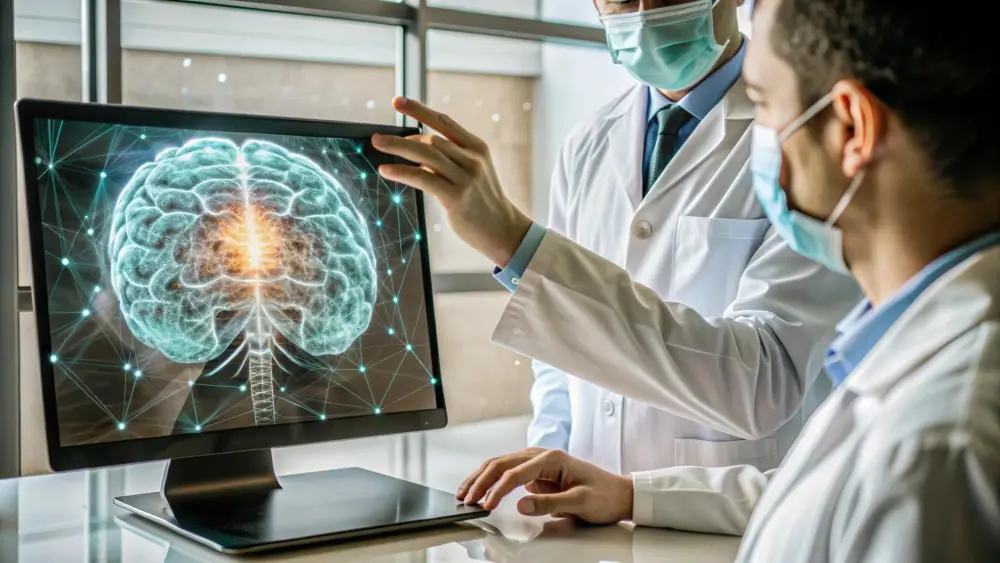Traumatic Brain Injury – Understanding, Treatment & Recovery
Traumatic Brain Injury, or TBI for short, can change lives in an instant. It affects not just the person injured but their families and communities too. Whether caused by a fall, a car accident, or a sports injury, a TBI is a serious condition. It can impact how the brain functions. Understanding this brain trauma is the first step toward effective treatment and recovery. Early action can make a huge difference in outcomes. That is why awareness and timely care are so critical. Getting a proper diagnosis as soon as possible helps doctors create a treatment plan tailored to the injury's severity. Delaying care can worsen symptoms and prolong recovery. However, Georgia Neurosciences (GA Neuro) is a trusted clinic for its expertise in managing TBIs, offering advanced diagnostics and personalized care plans to support patients and their families through this challenging time.

What Is Traumatic Brain Injury and What Causes It?

TBI happens when a sudden blow or push to the head disrupts normal brain function. TBIs range from mild (like a concussion) to moderate or severe. In moderate to severe cases, the damage can lead to long-term complications or even be life-threatening. A head trauma might cause temporary confusion. Or, in some cases, it can lead to permanent changes in thinking, movement, or behavior.
Common causes of brain trauma include:
- Falls. Especially among older adults or young children, slipping at home or on uneven surfaces can lead to TBIs.
- Car accidents. High-speed collisions often cause severe head traumas.
- Sports injuries. Contact sports like football or hockey carry risks of concussions.
- Assaults. Physical violence can result in significant brain damage.
For families and caregivers, understanding brain injury is vital. Knowing the risks and causes helps in prevention. And it ensures quick action if a trauma occurs. Choosing a provider like GA Neuro, with TBI doctors, can offer peace of mind and professional support during recovery.
Key Symptoms and Long-Term Consequences of TBI

The consequences of traumatic brain injury can be short-term or lifelong. Mild TBIs, like concussions, often resolve within weeks with rest. However, moderate to severe TBIs may lead to lasting challenges, such as:
- Difficulty speaking or understanding language
- Chronic pain or seizures
- Emotional struggles, including depression or personality changes
- Reduced ability to work or live independently
The symptoms of a brain trauma vary depending on the injury’s severity. They can show up immediately or develop over days. Recognizing these symptoms early helps in seeking the right care. Common symptoms include:
- Cognitive. Trouble concentrating, memory lapses, or feeling “foggy.”
- Emotional. Mood swings, anxiety, or depression.
- Physical. Headaches, dizziness, nausea, or fatigue.
- Behavioral. Irritability, aggression, or trouble sleeping.
For families, understanding these symptoms and consequences is vital for choosing the right treatment plan. A comprehensive approach, like those offered by GA Neuro, can address both immediate needs and long-term recovery goals, helping patients regain as much independence as possible.
Effective TBI Treatment and Rehabilitation Options
Treating a TBI requires a tailored approach. This is because every brain injury is unique. TBI treatment starts with acute care. It may involve stabilizing the patient in an emergency room, performing surgery to reduce brain swelling, or using medications to manage symptoms like seizures or pain. Once the patient is stable, the focus shifts to recovery.
Our brain trauma rehabilitation plays a central role in helping patients rebuild their lives. Rehabilitation programs often include:
- Physical therapy. To improve strength, balance, and coordination.
- Occupational therapy. To relearn daily tasks like dressing or cooking.
- Speech therapy. To address communication difficulties.
- Cognitive therapy. To enhance memory, problem-solving, and focus.
Our modern recovery programs combine these therapies with cutting-edge technology such as virtual reality or neurofeedback. These technologies can improve outcomes. Choosing a provider with expertise in TBI, like GA Neuro, ensures access to traumatic brain injury recovery. The recovery plan evolves with the patient’s changing needs. The right program can mean the difference between a partial recovery and a fuller return to daily life.
Life After TBI – Support, Monitoring & Continued Care
Life after a brain trauma is a journey that requires:
- Patience
- Support
- Ongoing care
After leaving the hospital, patients often face new challenges. These challenges range from managing symptoms to adjusting to changes in abilities. Families play a crucial role in this phase. Family members help their loved ones navigate physical, emotional, and social hurdles.
Post-traumatic brain injury care involves regular follow-ups with healthcare providers. These visits allow doctors to monitor progress and adjust treatment plans. This might include:
- Routine checkups to track cognitive or physical improvements
- Medication reviews to manage symptoms like pain or seizures
- Counseling to address emotional challenges, such as anxiety or depression
Emotional and social support is just as important. Support groups, either in-person or online, connect patients and families with others. These are people who truly understand what they’re going through. Community resources can help patients rebuild confidence and independence. Examples are vocational training or adaptive sports programs.
Life After TBI – Support, Monitoring & Continued Care
Life after a brain trauma is a journey that requires:
- Patience
- Support
- Ongoing care
After leaving the hospital, patients often face new challenges. These challenges range from managing symptoms to adjusting to changes in abilities. Families play a crucial role in this phase. Family members help their loved ones navigate physical, emotional, and social hurdles.
Post-traumatic brain injury care involves regular follow-ups with healthcare providers. These visits allow doctors to monitor progress and adjust treatment plans. This might include:
- Routine checkups to track cognitive or physical improvements
- Medication reviews to manage symptoms like pain or seizures
- Counseling to address emotional challenges, such as anxiety or depression
Emotional and social support is just as important. Support groups, either in-person or online, connect patients and families with others. These are people who truly understand what they’re going through. Community resources can help patients rebuild confidence and independence. Examples are vocational training or adaptive sports programs.
For TBI rehabilitation, consistency is key. Providers like GA Neuro offer structured follow-up care. They ensure patients have access to specialists who understand the complexities of TBI. This ongoing support helps patients and families feel empowered. This helps them understand they’re not alone in facing recovery challenges.
In conclusion, a TBI is a life-altering event. However, with the right care, recovery is possible. From understanding the causes and symptoms to accessing effective TBI treatment and rehabilitation, every step matters. Families and caregivers play a vital role in supporting loved ones through the process. Meanwhile, providers like GA Neuro offer the expertise needed for comprehensive care. Prioritizing early diagnosis is essential for timely intervention following a head injury. Tailored treatment plans, specifically designed for individual patient needs, are crucial for effective recovery and addressing unique challenges. Our comprehensive post-traumatic care and ongoing rehabilitation further support healing and adaptation. Through this integrated approach, patients can achieve meaningful and lasting progress. They can gradually reclaim their independence and rebuild their lives, one day at a time.